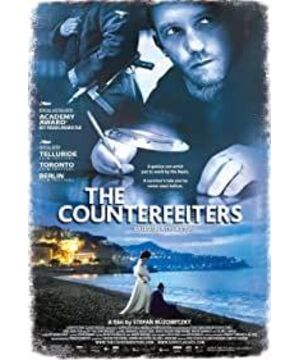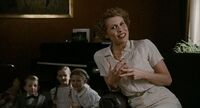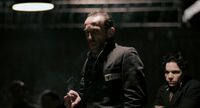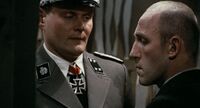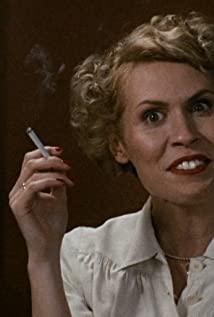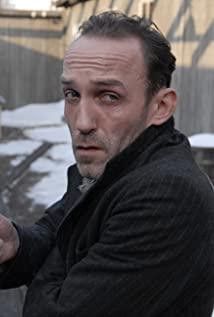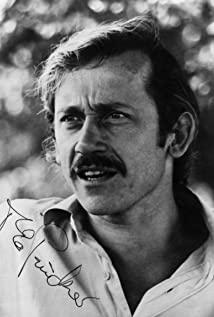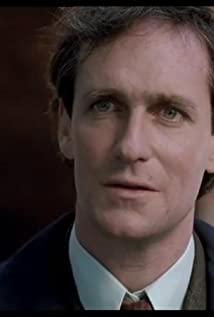In recent years, some German films have begun to target Nazi Germany during World War II with a new attitude, such as "The Fall of the Empire" in 2004 and "Hope and Resistance" in 2005. Those who dare to break past taboos and involve sensitive topics, of course, such films have a deeper, more diverse, and more inclusive interpretation of human nature. The Austrian-German co-production film "Counterfeit Maker", which was released in 2007, belongs to this category: based on real historical events, the narrative style is concise and serious, with no personal preferences and viewpoint biases, and no orientation to the audience. Induction, as for the right and wrong of the main characters described in the film, the film itself is noncommittal, and it is left to the audience to feel it.
When human beings lose the right to exist, how will their dignity, will, preferences, skills, etc. be attached? How will human nature struggle to survive in the dark? To what extent will the bottom line be lowered to be responsible for one's own actions? Is it possible to manage to keep yourself alive even if the condition is to let someone you know or not know die? Is fearless resistance followed by sacrifice worthwhile, or is it more meaningful to surrender to protect yourself and your companions? Unlike other films that reflect the hellish nightmare of concentration camps, the film has its own way of dissecting and interpreting the complexity of human nature in extreme situations.
Although the brutal scenes of heaping corpses like mountains or burning corpses in flames are not exaggerated, the film always creates an atmosphere of being next to the god of death. Making counterfeit banknotes for the Nazis is still an instant death. It's the ultimate torture for someone with a room, crematorium, bullets, and skills. If counterfeiting is for survival, is survival for counterfeiting? In the discussion of survival, the film is no longer limited to the body. When the body temporarily exists, the spirit and soul are begging for a way of survival that conforms to the laws of human nature. Therefore, concepts and emotions are constantly brewing and accumulating. For example, the old Jewish financier in the film bowed his head in embarrassment when the Nazi officers celebrated the success of forging sterling: "This is the most humiliating thing I have ever done in my life." laugh.
And the protagonist of this film, Sally (played by Karl Markweis), has a more complicated identity, heart, experiences and transitions. First of all, his identity is very special. He is a Russian-German Jew. He can speak Russian but is reluctant to speak. It seems that he has nothing to do with the revolution of the motherland. Furthermore, he used to make a fortune through counterfeiting. Before 1936, he made everything from dollars, passports, and documents. This skill gave him the title of "counterfeit king" and made him live a sensual life. It seems that there is no sense of right or wrong, so he has no entanglement and no sense of belonging and honor.
He is arrested by Friedrich Herzog (David Streisold) of the Berlin Police Department for fighting vicious economic crimes. After the outbreak of World War II, prisons became concentration camps, and Sally went from economic criminals to felonious Jews. At the Mauthausen concentration camp, Sally let people see his true artistic talent - painting, his skill can be said to have reached the level of perfection, and he also showed this skill to the guards at the right time, looking for him More and more Nazi officers were pictured, and soon he was taking up the job of drawing propaganda posters, so he was beaten less than others and ate well.
Next, Sally was transferred to the Sachsenhausen concentration camp north of Berlin, where his soul-searching began in earnest, where he met Friedrich Herzog, who was solely responsible for the selection of talented Jews in the camps. ——painters, printers, platemakers, financiers and counterfeiters, etc., and grouped these people together to form a "counterfeit banknote research and development team" to make sterling, and then make US dollars, so as to attack the economies of the Allies, "counterfeit banknotes" "The King" Sally became the chief technical officer here. Facing the threat of death, Sally compromised, and this time the performance was not just for food, but for survival.
The "counterfeit banknote research and development team" isolated in the concentration camp has been limited to develop counterfeit banknotes, and their living conditions have improved somewhat. However, the essence of this survival is to commit a crime and assist the Nazis, so that there is no difference between survival and stealing. One of the group's staunch anti-Nazis, Adolf Borg (August Diehl), lobbied Sally to give up the dollar with his revolutionary ideas, but Sally said, "I'm alive now, I'm not alive. shameful". Adolf asked bitterly: "Is the meaning of life is to make counterfeit banknotes?"
Facts show that it is not enough to endure it and be at peace. Sally, who was cleaning the toilet, was urinated all over by the arrogant Herzog, and he was angry. After smashing the washbasin, and then hearing the sound of Jews being shot across a wall, he lost control and got into a fight with Adolf. Then, someone committed suicide after learning of the child's death. Fortunately, the young Camillo also suffered from tuberculosis and was in danger of being found and shot. Adolf's wife was killed in the original concentration camp. Adolf was very sad... More and more people are pinning their hope of survival on Sally. At this time, Sally seems to have become a barely visible protective film, encouraging the desperate and timid, and helping to protect the sick. Man, he protected Adolf when the Nazis wanted to track down saboteurs and warned those who wanted to sue Adolf out of a desire to survive, "If you expose him, I will kill you".
It can be said that Sally has never been a "positive character" in the traditional sense. All of his actions are mostly driven by circumstances and spontaneous. He protects his companions because he does not want to see them die, and he compromises with the Nazis in exchange for medicines. It is also his inertia as a former businessman. At the end of the film, Sally after the war deliberately lost all the counterfeit banknotes that he hid in the concentration camp at the casino, as if he wanted to wash away his stubborn past and find the sense of survival of his soul. On the beach at night, Sally was sitting alone, a woman came to him, and they danced tango. At the beginning of the film, Sally also danced tango with a woman. It was interesting to exchange head and tail, but the situation and mentality were completely different. different.
The script for the film is based on the book "Devil's Factory" written by Adolf Borg, which details his personal experience. The film is directed by Austrian director Stefan Ruzowitzky, who has expressed his desire to make a film that is not just about the history of Nazi Germany during World War II, and it seems he did. And his cleverness is that he did not define Adolf and Sally as the two ends of good and evil, and in terms of right and wrong, the film did not give an actual answer, because in that era and environment, many people and things It is difficult to generalize easily.
The film is compact in structure, clear in context, and well-made. The actors' excellent acting skills capture the deepest and most core part of human nature in a special environment. At the same time, Zhang Chi's moderate rhythm vents a touching emotional climax. The application of the soundtrack in the film is also quite distinctive, including the haunting tango clips and harmonica music, as well as the singing of male vocals, especially the cruel scenes in the concentration camps with the bel canto. And the sound effect processing of one of the lines is ingenious - in exchange for the progress of counterfeiting dollars, Sally finally got the treatment medicine from Herzog, when he went to the seriously ill Camillo, he accidentally witnessed Camille The scene of Luo being shot and killed by the Nazis, and then he heard the bastard officer with the gun announce to the crowd that Camillo had tuberculosis and killed him for fear of infecting others, "He died happily". And this passage, to Sally, who was severely injured and in pain, sounded as if his ears were ringing.
( http://nicolew.blog.hexun.com/15972926_d.html )
View more about The Counterfeiters reviews


